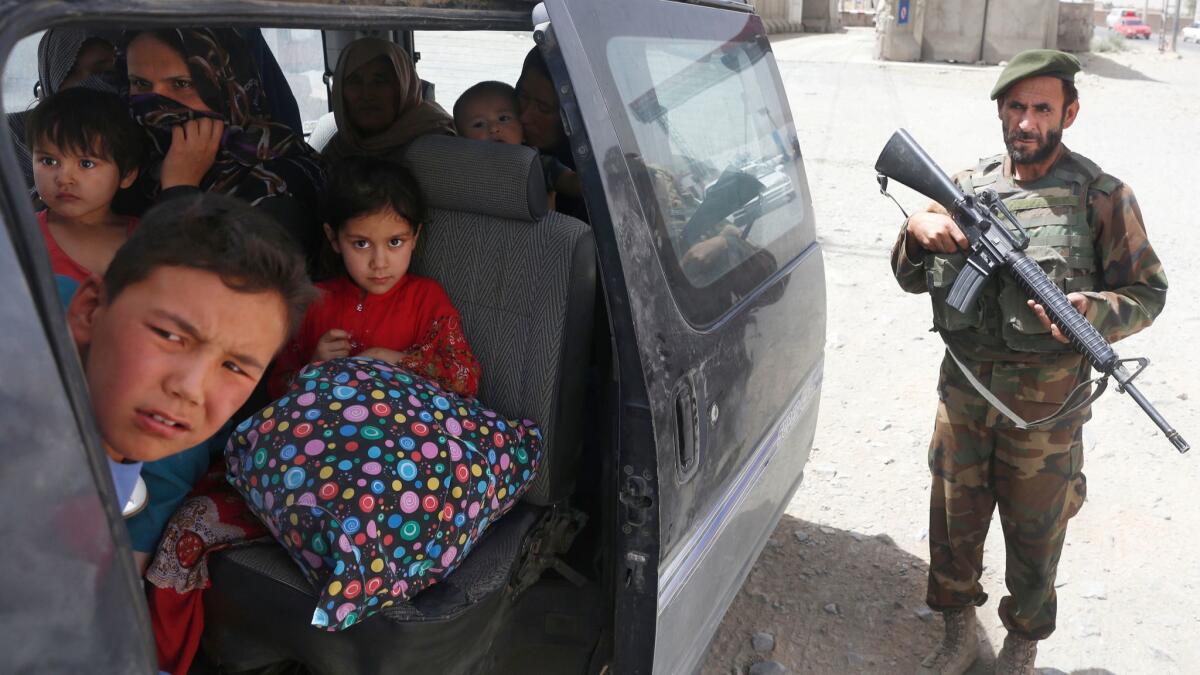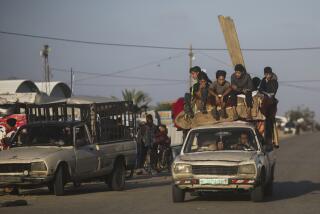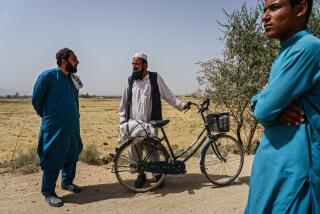120 Afghan forces and civilians killed in battle with Taliban in strategic city

- Share via
Reporting from KABUL, Afghanistan — More than 100 members of Afghan security forces and 20 civilians have been killed in four days of heavy fighting with the Taliban in a strategic city, officials said Monday, illustrating the potency of the insurgency even as the U.S. pursues peace talks.
The clashes in Ghazni, about 90 miles southwest of Kabul, the capital, began early Friday and have forced throngs of residents to flee the city by road while others took shelter in their homes.
About 1,000 Afghan troops were sent as reinforcements Monday and helped “to prevent the collapse of Ghazni city to the enemy,” but fighting was ongoing, Defense Minister Tariq Shah Bahrami told reporters in Kabul.
U.S. military advisers were sent to Ghazni to assist Afghan forces, and U.S. warplanes launched airstrikes that killed 140 suspected insurgents since Friday, according to the U.S.-led NATO coalition. Afghan officials said a total of nearly 200 Taliban had been killed in the fighting.
“Hopefully within 24 hours, the situation will be changed remarkably,” Bahrami said.
Just last month, representatives of the Taliban held the first direct talks with U.S. officials, part of a push by the Trump administration to end the 17-year conflict. The meeting reportedly took place in Qatar and involved Alice Wells, a senior State Department official, but no representatives of the Afghan government.
U.S. and Afghan officials have said the prospects for peace talks are encouraging.
But the offensive in Ghazni, which Afghan officials said was carefully planned and involved insurgents from multiple provinces, showed that the Taliban plans to keep fighting to improve its negotiating position.
Even if the Afghan government keeps control of Ghazni – a provincial capital on the main highway leading to Kabul – the situation in the city of 270,000 was bleak, with civilians killed and injured in crossfire and bodies piling up in overwhelmed health facilities. In interviews Sunday, residents described scenes of chaos.
“There are many dead bodies – they’re stinking because they’ve been brought since the first day of fighting,” said Sayed Abdul Hakim, a 24-year-old shopkeeper who had come to Ghazni’s main hospital where his brother was being treated for a shrapnel wound.
“This is a hospital where people should get well, but instead we’re getting sick from this smell. My brother has been lying here and no one takes care of him.”
On Sunday, battered sedans pulled up to the hospital entrance carrying wounded civilians, who were carried into the crowded hallways by volunteers. In the distance, plumes of dark smoke rose from a fabric market that the Taliban had set ablaze as fighters stormed through the city.
At a morgue on the hospital grounds, dozens of dead bodies, most of them members of the security forces, lay in simple wooden coffins surrounded by buzzing flies.
“Both sides are killing people, no matter who does what, but we have been suffering,” said Wahidullah, a 25-year-old shopkeeper who had brought his injured brother to the hospital, and like many Afghans has only one name.
“He’s shot in the back – I’m not sure by whom.”
Electricity and cellphone service have been cut off in much of the city, with some residents blaming the Taliban for attacking the infrastructure. U.N. humanitarian officials said Monday that the power shortage had limited the supply of water in Ghazni and food supplies were running low.
“Medication at the main hospital is reportedly becoming scarce and people are unable to safely bring casualties for treatment,” Rik Peeperkorn, acting U.N. humanitarian coordinator for Afghansitan, said in a statement.
“Main access roads both north and south of the city to larger cities where medical facilities are available are contested and unsafe for people to travel.”
Bahrami did not give a breakdown of the casualties but Wais Ahmad Barmak, the interior minister, said that about 70 of the dead security forces were members of the police.
“The people should be proud of their security forces,” Barmak said.
Special correspondent Faizy reported from Kabul and Times staff writer Bengali from Mumbai, India. Special correspondent Mohammad Anwar Danishyar contributed to this report from Ghazni.
Shashank Bengali is The Times’ South Asia correspondent. Follow him on Twitter at @SBengali
UPDATES:
10:45 a.m.: This article was updated throughout with Times reporting.
This article was originally published at 5:05 a.m.
More to Read
Sign up for Essential California
The most important California stories and recommendations in your inbox every morning.
You may occasionally receive promotional content from the Los Angeles Times.











